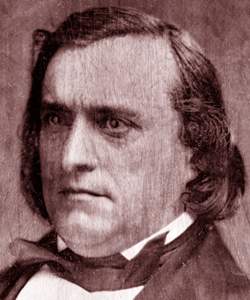Pierre Soule (American National Biography)
Scholarship
In the 1860 presidential election, Soulé's supporters rallied behind Douglas, who finished a poor third in the state. He led the cooperationists during the secession crisis not to support the Union but to oppose Slidell, who led the immediate secessionists. Soulé announced frequently and firmly that secession was inevitable and that he did not intend to be in the rear of that action. He admonished audiences, demanding that they recall his advocacy of secession in 1850 and that they remember repudiating his advice. Louisiana seceded, but the Confederacy had little to offer Soulé.
By experience and temperament, Soulé was unsuited to the world of politics and diplomacy. He cut his political teeth on revolutionary movements in France, and he continued to think and speak in terms of principle and of his perception of right and wrong. He readily supported those perceptions whether with a dueling pistol in his private life or with recommendations for war against Spain or the antislavery North in his public life. Tact was simply beyond his purview.
By experience and temperament, Soulé was unsuited to the world of politics and diplomacy. He cut his political teeth on revolutionary movements in France, and he continued to think and speak in terms of principle and of his perception of right and wrong. He readily supported those perceptions whether with a dueling pistol in his private life or with recommendations for war against Spain or the antislavery North in his public life. Tact was simply beyond his purview.
Carolyn E. De Latte, "Soulé, Pierre," American National Biography Online, February 2000, http://www.anb.org/articles/04/04-00932.html.
Pierre Soulé (Congressional Biographical Dictionary)
Reference
SOULÉ, Pierre, a Senator from Louisiana; born in Castillon-en-Couserans, near Bordeaux, France, August 31, 1801; attended the Jesuit College at Toulouse and later an academy in Bordeaux; exiled to Navarre at the age of fifteen for anti-Bourbon activity and worked as a shepherd boy in the Pyrennes for a year; pardoned in 1818 and returned to school in Bordeaux; studied law in Paris and practiced; engaged in journalism; imprisoned for publishing revolutionary articles in 1825, but escaped to England; went to Haiti in 1825, and then to the United States; after travelling around the nation, commenced the practice of law in New Orleans, La.; member, State senate 1846; elected as a Democrat in 1846 to the United States Senate to fill the vacancy caused by the death of Alexander Barrow and served from January 21 to March 3, 1847; again elected to the United States Senate and served from March 3, 1849, to April 11, 1853, when he resigned; chairman, Committee on Agriculture (Thirty-second Congress); Minister to Spain from 1853 until his resignation in 1855; author of the Ostend Manifesto in 1854, outlining the attitude the United States should take in regard to Cuba; resumed the practice of law in New Orleans, La.; was opposed to secession, but abided by the action of his State; when New Orleans was captured, he was arrested and imprisoned in Fort Lafayette, N.Y., for several months; paroled to Boston and fled to the Bahamas; travelled to Richmond, Va., to aid the Confederacy; moved to Havana, Cuba, but subsequently returned to New Orleans, La., and died there March 26, 1870; interment in St. Louis Cemetery No. 2.
“Soulé, Pierre,” Biographical Directory of the United States Congress, 1774 to Present, http://bioguide.congress.gov/scripts/biodisplay.pl?index=S000682.





